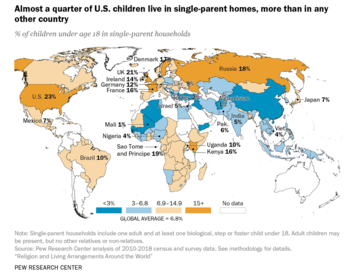
Welcome to my weekly digest, with the best articles from around the web and a roundup of my recent writings and appearances.
The Atlantic has an article out called “Is Single Parenthood the Problem?.” Unfortunately for the author’s politics, the answer is Yes. The piece takes a look at some of the grim findings from the new book The Two-Parent Privilege, much of which I’ve posted in the past. But it ends with this whopper.
The real elephant in the room, I think, is that the United States doesn’t want to contemplate, let alone create, a policy infrastructure that supports single parenthood. It doesn’t want to make sure that kids thrive with a single earner in the home. It won’t do this even though it seems obvious that a large share of children are going to grow up with one parent going forward, and even though we aren’t realistically going to increase the marriage rate among lower-income Americans. We don’t want to build a society where children are seen as a collective gift and a collective responsibility. It’s not single parenthood that’s failing these kids. We all are.
How, precisely, are we supposed to create this “policy infrastructure”? Undoubtedly her prescription would involve unbelievably massive amounts of income redistribution. This is explicitly what Rebecca Traister calls for in a New York magazine piece critical of pro-marriage rhetoric and policy.
In addition to being regressive, telling people to get married — as both the George W. Bush and Barack Obama administrations did through billion-dollar marriage-education programs — doesn’t even work. But the kinds of benefits that can be legislated and would help to address the crises of contentment and inequality — expanding social safety nets, strengthening labor laws, changing our tax code, overhauling housing policies, making education affordable, passing paid leave and child care, reimagining the criminal-justice system, restoring reproductive autonomy — all of that … it’s a daunting prescription. And, of course, it’s completely at odds with the conservative agenda, which is to revert this country’s power structure to what it was before the upheavals of the mid-20th century.
The idea seems to be that not only should people have unlimited autonomy and social approval to choose single parenthood, but that they are entitled to have everybody else underwrite their decision.
The United States has the highest percentage of kids living in single parent homes in the entire world. Economist Raj Chetty found that the top correlate of low socio-economic upward mobility in neighborhoods is the share of single parent households. Yes, there’s no doubt a lot of people are in single parent households and we have to do what we can to help those kids. But anyone who is not willing to take real steps to reduce this going forward is simply not serious about solving our social dysfunctions.
Relatedly, Richard Reeves has argued for redefining fatherhood to separate it from marriage. Leah Libresco Sargeant took issue with this, writing that “Father” Is Not a Part-Time Job. Reeves penned his own response to that.
Again, there are already so many children who don’t have their father at home that some type of reconceptualizing the role for them is necessary to deal with the situation we find ourselves in. At the same time, these things have a tendency to undermine the normal and better case. We need to make sure that going forward we are reducing the share of single parent households.
Read the rest of this piece at Aaron Renn Substack.
Aaron M. Renn is an opinion-leading urban analyst, consultant, speaker and writer on a mission to help America's cities and people thrive and find real success in the 21st century. He focuses on urban, economic development and infrastructure policy in the greater American Midwest. He also regularly contributes to and is cited by national and global media outlets, and his work has appeared in many publications, including the The Guardian, The New York Times and The Washington Post.
Chart: Pew Research.












